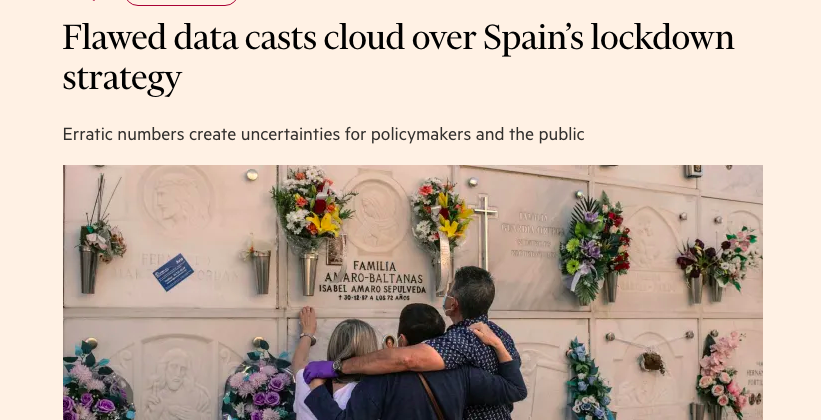04.06.2020 - 13:58
|
Actualització: 04.06.2020 - 15:58
The Financial Times published an article today warning about political decisions taken in Spain on the basis of official Covid-19 data, as the Spanish government’s figures are often erroneous. Spain’s Ministry of Health headed by Salvador Illa recently changed the counting method. ‘According to official data on the coronavirus, there have been no new deaths in the last forty-eight hours in Spain. But on the same day, at least two regions – Madrid and Castilla la Mancha – reported seventeen deaths due to the virus between the two’, explains the FT.
NEW: much has been made this week of Spain recording zero new Covid deaths for two successive days.
Spanish Prime Minister Pedro Sanchéz called it "A success for all".
Unfortunately it’s also nonsense.
Story by me & @danieldombey: https://t.co/kThBKffKeD
Thread follows:
— John Burn-Murdoch (@jburnmurdoch) June 4, 2020
The article tells how the controversial change in the way deaths are counted has caused ‘the mortality rates recorded by the Ministry of Health to plummet, and that their death toll accumulated since the beginning of the pandemic was reduced by almost 2.000’.
These changes in the data and in the way it is measured have led the newspaper to ask a few experts what it may involve. ‘It’s 100% sure that there is a problem with the data,’ says Jeffrey Lazarus, head of the health systems research group at the Institute of Global Health (ISGlobal) in Barcelona. ‘The data is driving us crazy. And the number zero has a lot of power, because it causes a false sense of security among the population. ‘
Lazarus refers to the fact that the Spanish government has recently used the figure of zero deaths in one day as a political success. And the authors of the Financial Times article write: “Speaking in Congress on Wednesday, Pedro Sánchez celebrated zero deaths as an achievement. His government says this is a proof of lockdown success. But some researchers say government figures need to be deeply questioned because of revisions in the Health ministry’s counting system”.
“In real time, changes in detection or notification can make it difficult to determine what the actual extent of the epidemic is” says Adam Kucharski, an epidemiologist at London’s School of Tropical Medicine.


